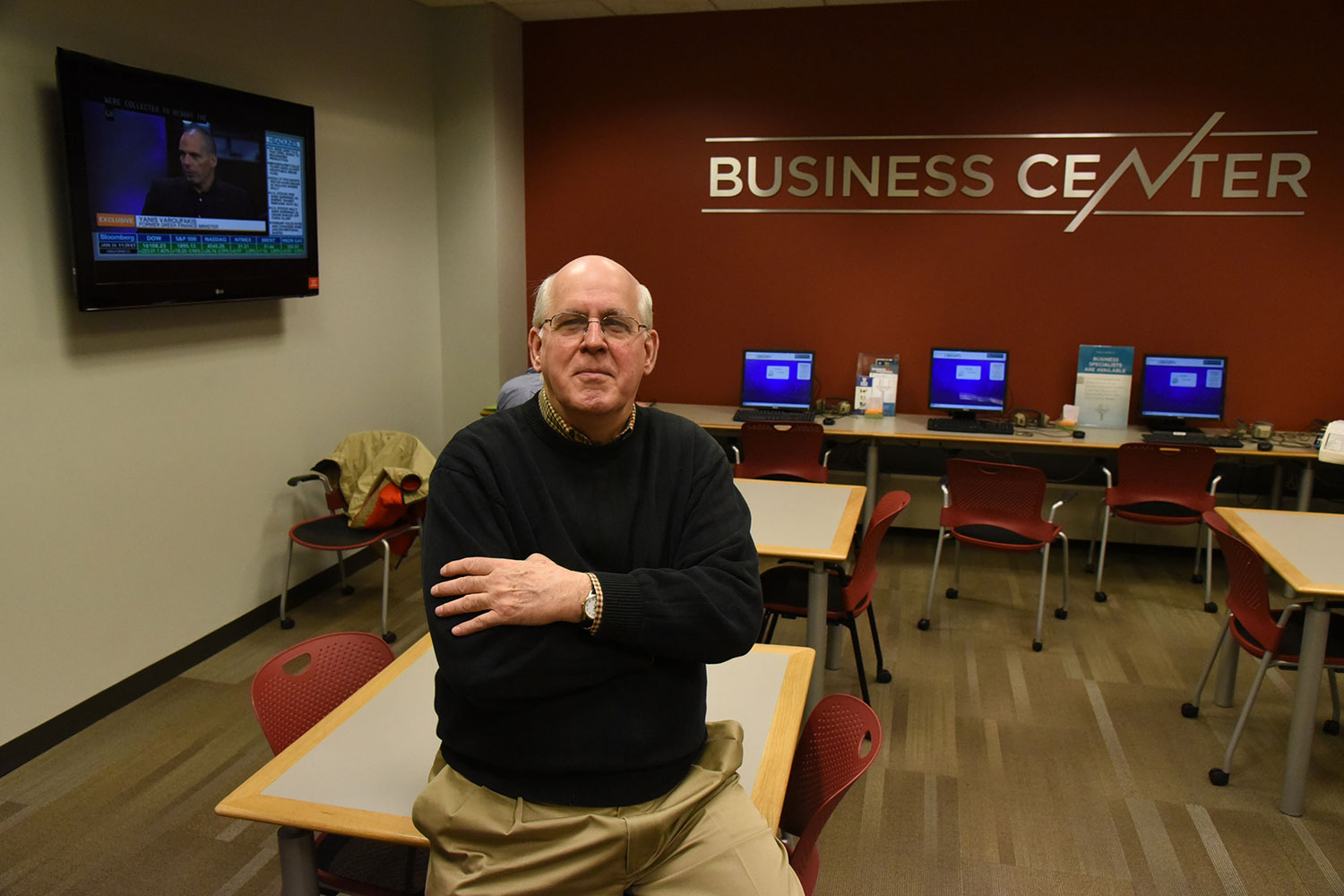Picturing a typical entrepreneur, many people conjure images of young, tech-savvy and ambitious college graduates, juggling at least three devices in an office with at least one Ping-Pong table.
Jeff Williams, however, zeroes in on the 50-plus age group.
A 1970 graduate of the University of Virginia’s McIntire School of Commerce, Williams founded his company, Bizstarters, in 1991 to help Baby Boomer entrepreneurs launch their own businesses. Twenty-five years later, that niche focus has built a thriving business and made Williams a go-to source for the Associated Press, CNN, Forbes and others discussing a spike in older entrepreneurs.

Jeff Williams, a 1970 graduate of UVA’s McIntire School of Commerce, has devoted his career to helping Baby Boomers like himself launch successful startups. (Photo by Dan Addison)
A 2015 Gallup survey found that people over 50 were among the fastest-growing groups of new entrepreneurs in the U.S. Compared with millennials, they are roughly twice as likely to plan on starting a venture in the next year. Their success – typically powered by large professional networks and savings accrued from years of work – has made them an economic force to be reckoned with.
UVA Today spoke with Williams to find out more about this increasingly influential group.
Q. What motivates many of your clients to start their own businesses?
A. What really activates these people is a desire to keep working. Baby Boomers – and I count myself as one – do not have our parents’ belief that once you leave a traditional job, you stop work altogether. Boomers want to feel that they are still contributing, still in the game and still doing something interesting.
Having said that, another important motivation, of course, is financial. All of my clients would like to earn extra income. A recent survey [from the Bureau of Labor Statistics] found that 20 percent of Americans over 65 are still working – the highest percentage since 1960. Many do not have enough money saved to retire. About a third of my clients have been downsized and many took a hit to their 401K or real estate assets during the recession. Running their own business permits them to rebuild retirement assets while doing work they enjoy.
Q. Do you see any trends in the types of businesses that your clients start?
A. The businesses are varied, but I have noticed a new generation of entrepreneurship built around sharing knowledge and training know-how. My business is a combination of traditional consulting and sharing knowledge and expert information through books, workshops and online courses. Two of my clients right now are writing books centered on their work experience and planning companies around those books.
Q. What are some key differences between millennial entrepreneurs – the archetypal entrepreneurs seen in the media – and Baby Boomer entrepreneurs?
A. I just finished a yearlong project helping a high school entrepreneurship class develop business ideas, so I have observed the differences firsthand. Millennial entrepreneurs often go right to technology and often want to create digital products or services, such as smartphone apps. That is not as common in older entrepreneurs. Younger entrepreneurs are also comfortable engaging their team digitally or over text, while 50-plus entrepreneurs focus on face-to-face and phone meetings.
Boomer entrepreneurs have a very different perspective starting out. A 25-year-old entrepreneur thinks they may be Mark Zuckerberg. A 55-year-old has no such thoughts. They want to keep working into their 60s, doing work they enjoy on a flexible schedule and making some nice income to supplement their retirement earnings.
Q. What unique challenges do older entrepreneurs face?
A. Boomer entrepreneurs often worry about using retirement savings to start a business. They also have to think about physical stamina. The Silicon Valley lifestyle of not sleeping for days simply does not work in my age group. You have to be realistic about what you can and cannot do. Some Boomer entrepreneurs are less familiar with the latest business technology. That is why my company’s Virtual Incubator business start-up program offers a full support team to handle clients’ Web and social media presence.
Q. What unique advantages do older entrepreneurs have?
A. So many. Age is often a detriment in the job market, but a plus in the entrepreneurial world. People pay for expertise, experience and wisdom, and Baby Boomers have it. Boomer entrepreneurs also have very good networks. Our average client, at about 57 years old, has over 2,000 people in their LinkedIn network. They have often had to hire or fire people and are good at reading if someone is sincere and capable. They are also very project-oriented. Many of the Boomers came into the workplace when project management techniques were pioneered. It’s in our bones.
Q. What key advice would you give to fellow Wahoos looking to start a business?
A. First, think about your life plan before you consider your business. What do you want to happen over the next two or three years? As you explore business ideas, make sure that you honestly evaluate time demands and relate that to your desired life plan. Today, you can run a business full-time, part-time or just sometime.
Second, remember that successful businesses come from one simple concept. You need to solve a problem for someone. That is why a lot of Boomers tend to go into work that they already know well, whether from industry experience or a longtime hobby.
Third, there is a lot of help out there. You do not have to do this alone.
Finally, you can launch a really solid business for well under $10,000. You do not have to risk killing all of your retirement assets.
UVA graduates already have an advantage. When you walk out of UVA, you are someone who can step forward on things. UVA graduates have a really well-developed sense of how to step out on their own, and that is really valuable for entrepreneurs.
Media Contact
Article Information
June 1, 2016
/content/qa-why-more-baby-boomers-are-turning-entrepreneurship

